Survey and implementation research on telemedicine and remote care
I. Actual conditions related to telemedicine
With the spread of the new coronavirus infection that began in 2020, so-called “online medical care” has come into the limelight in Japan. Online medical care” refers to a doctor-patient (D-to-P) medical practice in which doctors treat and diagnose patients through information and communication devices such as PCs and smartphones, and communicate diagnostic results and prescribe drugs in real time.
The advantages of online medical care include: for patients, it saves time during hospital visits and allows visits even when it is difficult to go out due to the patient’s physical condition or inclement weather, etc. For physicians, it allows them to continuously monitor the patient’s condition. On the other hand, the disadvantages of this system include the possibility of overlooking a patient’s condition or misdiagnosing a patient, as compared to face-to-face consultations, because the patient is treated through a screen.
In Japan, four items such as online medical fees and online medical management fees were newly established as medical fees in April 2018, and in the 2019 revision of the guidelines, online medical treatment when the patient is with a nurse (D to P with N) is newly positioned as a form of online medical treatment. On June 18, 2021, the Cabinet approved the Regulatory Reform Implementation Plan, which permanently allows online medical care starting in FY2022. In utilizing online medical services, it is an important theme to provide continuous medical care while ensuring the safety and security of both patients and medical professionals.
In the past, many research groups have studied, investigated, and obtained research findings1)-10) , but with an eye on the future of Japan’s aging society with a very low birthrate, we are now focusing on the perspectives and actions of home health care nurses, focusing on “what is the role of home health care nurses (D to P with N) who provide care to patients who use online medical services at home”. We would like to clarify how home health care nurses who provide assistance to patients and their families who use online medical services at home, how they assist doctors and how they contribute to effective patient consultations, focusing on their perspectives and actions, using ethnography and interview data collection methods. We would like to clarify these data by using ethnography and interview data collection methods.
1) Sugawara Y, Hirakawa Y, Iwagami M, Kuroki H, Mitani S, Inagaki A, Ohashi H, Kubota M, Koike S, Wakimizu R, Nangaku M. Issues in the Adoption of Online Medical Care: Cross-Sectional Questionnaire Survey. J Med Internet Res. 2024 Nov 1;26:e64159. doi: 10.2196/64159. Erratum in: J Med Internet Res. 2024 Nov 27;26:e68439. doi: 10.2196/68439. PMID: 39486019; PMCID: PMC11568393.
2) Wakimizu R, Kuroki H, Ohbayashi K, Ohashi H, Yamaoka K, Sonoda A, Muto S. Perceptions and Attitudes Toward Telemedicine by Clinicians and Patients in Japan During the COVID-19 Pandemic. Telemed Rep. 2021 Jul 19;2(1):197-204. doi: 10.1089/tmr.2021.0012. PMID: 35720764; PMCID: PMC8812287. Wakimizu R, Kuroki H, Ohbayashi K, Ohashi H, Yamaoka K, Sonoda A, Muto S. Perceptions and Attitudes Toward Telemedicine by Clinicians and Patients in Japan During the COVID-19 Pandemic. Telemed Rep. 2021 Jul 19;2(1):197-204. doi: 10.1089/tmr.2021.0012. PMID: 35720764; PMCID: PMC8812287.
3) Wakimizu R. Multidisciplinary involvement in online medical care: From interviews with users and their families. Journal of the Japanese Society of Pediatric Emergency Medicine, Vol. 22, No. 2, Page210, 2023.
4) Wakimizu R. Practice of Online Clinical Practice: The Role of Multidisciplinary Professionals in Online Clinical Practice. Pediatrics, Vol. 54, No. 12, Page1991-1994, 2022.
5) Muto S, Kuroki H, Wakimizu R, Ohbayashi K, Sonoda A, Ohashi H, Yamaoka K. Web-based Questionnaire Survey Study on the Response of Online Medical Practice and Its Impact in Light of the Spread of New Coronavirus Infections From the Perspectives of Physicians and Patients. Journal of the Japanese Society for Telemedicine, Vol. 18, No. 1, Page2-16, 2022.
6) Waikimizu R. Pediatric Nursing and ICT Remote Nursing Practice and Education] Practice for Children Using ICT Online Pediatric Practice and the Role of Nurses. Pediatric Nursing, Vol. 44, No. 9, Page1138-1147, 2021.
7) Waikimizu R, Kuroki H, Ohbayashi K, Yamaoka K, Ohashi H, Muto S. Physicians’ and Patients’ Perceptions of Online Medical Care During the Spread of Novel Coronavirus Infections. Precision Medicine, Volume 4, Issue 6, Page569-575, 2021.
8) Wakimizu R, Saito Y, Mochizuki K, Kuroki H. A survey of attitudes toward online medical care among primary caregivers of children who use a pediatric clinic as their primary caregiver under the situation of spreading novel coronavirus infection (COVID-19). Journal of the Japanese Society of Nursing Research, Vol. 44, No. 1, Page25-38, 2021.
9) Wakimizu R. The Family Experiences of Children Receiving Online Medical Care: A Survey of Primary Caregivers Using Semi-Structured Interviews. Clinical Pediatrics, Vol. 73, No. 6, Page821-827, 2020.
10) Sasaki M, Wakimizu R, Yamaguchi K, Kuroki H. Characteristics of Online Clinical Practice Compared to Face-to-Face Care as Perceived by the Child’s Primary Caregiver. Ambulatory Pediatrics, Volume 22, Issue 1, Page2-11, 2019.
II. Remote care system to promote empowerment of families caring for children with disabilities
People who support family members or close relatives in need of long-term care, nursing care, or medical treatment without compensation are called “caregivers. Continuing to provide medical care at home without utilizing social resources can be an undue burden for caregivers. Empowerment of caregivers to adjust their lives is called family empowerment. It has been shown that in order to promote family empowerment, it is essential for caregivers to reduce the burden of caregiving and to feel competent in utilizing social resources.
In order to empower the family without isolating them socially, a remote care system that all caregivers can access from their “private” space as soon as possible after the transition of a child in medical care to home (specifically, (1) access to family empowerment programs, (2) individual consultation with professionals, and (3) access to caregivers who have similar concerns) is required.
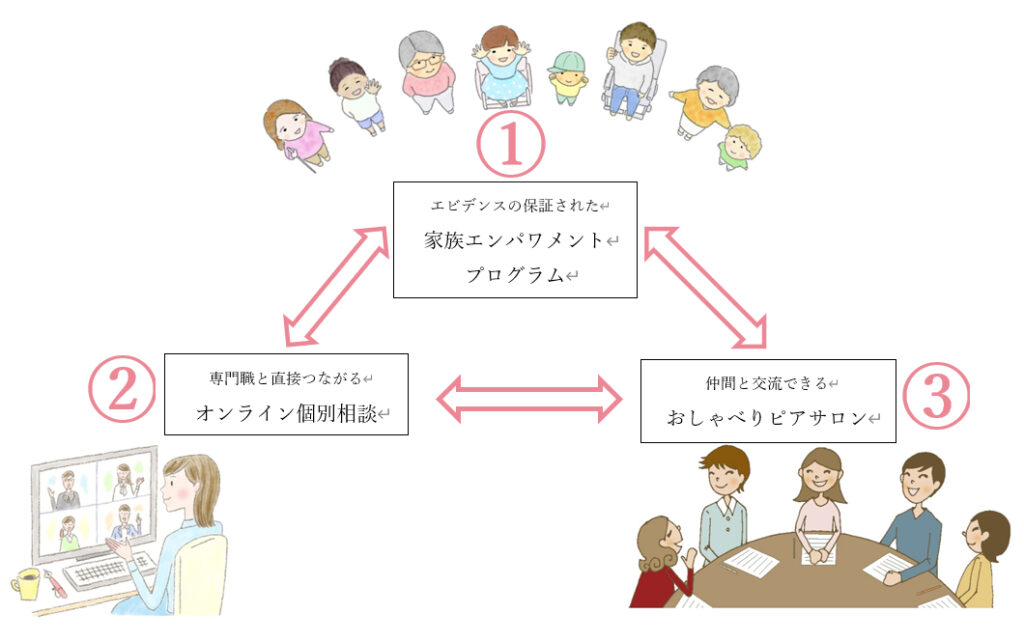
①Family Empowerment Programs with evidence-based assurances
②Online individual consultation to connect directly with professionals
③Talking peer salons where you can interact with your peers
About Remote Care System for Caregivers
①Family Empowerment Program
- Online program once a week (4 sessions in total)
- Resident professional (facilitator)
- The participants are able to objectively assess their own and their family members’ lives and the current state of care, and adjust their care burdens and utilization of social resources for the future.
Specific Contents
- Textbooks are used throughout all 4 sessions
- Creation of eco-maps and living charts through group and homework
Session 1: Learn about the current situation surrounding your child and family
Session 2: Reflect on the actual life of your child and family and identify the desired life.
Session 3: Set goals for the desired life of your child and family
Session 4 Reflect on the group work so far
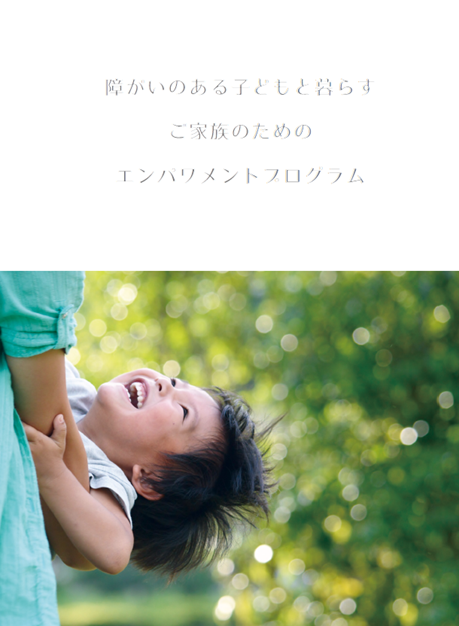
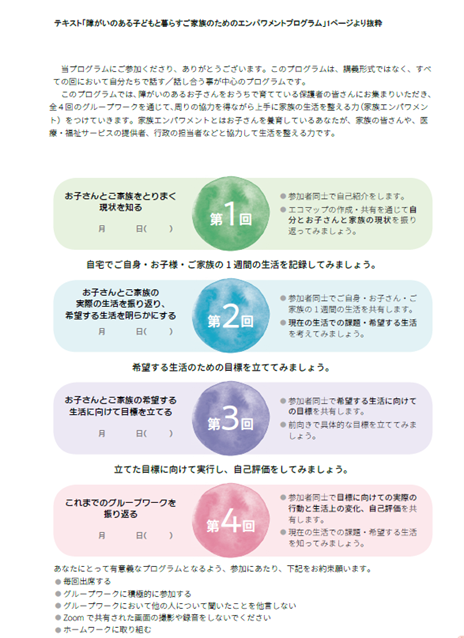
② Online individual consultation
We will set up a place where you can consult with CNS (Certified Nurse Specialist) and other medical, educational, and social welfare professionals about individual concerns from a “private” space. The staff of the Care Management Center selects specialists according to the content of the consultation that is accepted 24 hours a day, 365 days a year, and after adjusting the date and time, the specialist directly receives consultation from the registrant.
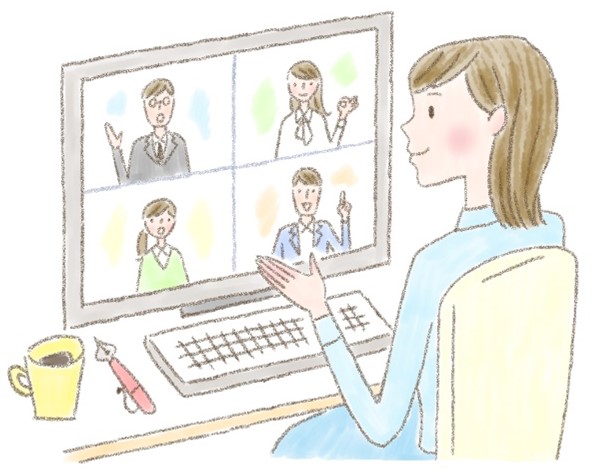
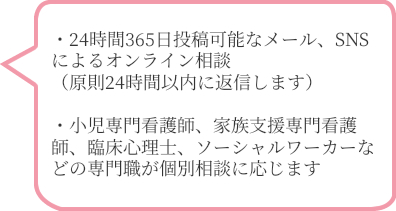
③ SHG Talking Peer Salon
- Regularly hold classes such as “Mother’s Association”, “Father’s Association”, “Sibling Association”, and “Grandparents Association”
- Chat online with like-minded caregivers
- Professional (facilitator) resident
- You can share your worries and information
At the SHG Talking Peer Salon, with the cooperation of existing parents’ associations and siblings’ associations, you can chat with caregivers who share the same position, such as “mothers’ association”, “fathers’ association”, “siblings’ association”, and “grandparents’ association”. We will set up a place where you can exchange information.
![]() To all professionals (*), please implement the remote care system in society.
To all professionals (*), please implement the remote care system in society.
With the aim of reducing the sense of burden and difficulty for caregivers and educating and enlightening professionals involved with caregivers, the Remote Care System will be the first social implementation of the Remote Care System in Japan, which consists of (1) a family empowerment program, (2) online individual consultations with professionals, and (3) providing a place for the SHG Chatting Peer Salon.
We would like to ask those who are interested in our remote care system to watch the e-learning training video and take the test (5 questions), then register as a supporter and work within the care system.
(*) Medical personnel, caregivers, educators, government welfare officials, etc. who are regularly involved with the children and their families
サポーター申し込み(専門職・一般の方)




